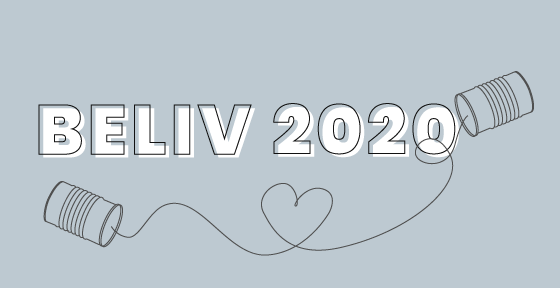



We invite contributions to BELIV 2020, the international forum to broadly discuss research methods in visualization. Our discussions span from novel and not-yet fully established evaluation methods for visualization tools and techniques, to methods that more generally establish the validity and scope of acquired visualization knowledge. BELIV supports contributions and discussions from the rich spectrum of visualization researchers, embracing the varied ways that researchers self-identify with respect to the main conference tracks at VIS.
This year: Complementary to the broad scope of BELIV and its general commitment to research methods, BELIV 2020 will include a timely focus topic: From a Distance: Research practices during the COVID-19 pandemic and beyond. This topic is focused on assessing our challenges and sharing our experiences in conducting research during the COVID-19 pandemic. Evaluations need to be conducted under conditions where researchers and participants are socially distant, confined at home, and without access to special equipment or a professional work environment, and teams need to maintain cohesion using solely digital communication tools. BELIV 2020 will be a place for the community to discuss and share what we’ve learned through navigating these unprecedented challenges, and what it might mean for the future of visualization research.
In keeping with this year’s theme of From a Distance, BELIV 2020 will be a virtual event to ensure the broadest possible participation regardless of potential travel restrictions and continued health concerns. While the exact format of BELIV 2020 is still uncertain, we anticipate online presentations of papers and an online version of interactive workshop components.
Among the global devastation due to the COVID-19 epidemic, this year has been marked by extraordinary living and working conditions for many visualization researchers. It has not only given us new perspectives on work-life priorities but it has also impacted how we conduct collaborative and user-facing research, with potentially long-term implications.
In response, the focus topic for BELIV 2020 is : From a Distance: Research practices during the COVID-19 pandemic and beyond. We are interested in experiences, adapted practices, and methods for conducting research and evaluations while participants and researchers are dealing with social distancing, confinement, and other atypical working conditions. To this end, we are soliciting papers that describe experiences and challenges in conducting visualization research and evaluations, such as:
BELIV 2020 also seeks papers on the broader topic of research methods in visualization, which include, but are not limited to:
The workshop focuses on contributions from all areas of visualization, including VAST, InfoVis, and SciVis.
We accept 3 types of submissions—
Research papers aim to make progress toward novel research methods in visualization and to discuss their benefits and limitations compared to traditional methodologies. As in past editions of BELIV, we will not accept papers that merely report on the use of a method or methodology unless the focus of the contribution is on lessons learned about applying a novel method and new insights on the method itself are presented. Research papers present new work and unpublished results on the topic areas of the workshop, including the focus topic. Research papers will be selected according to their novelty, quality, and relevance.
Position papers are problem discussions or statements describing the author's relevant experience and ideas in regards to methods and methodologies for visualization research, and in particular the focus topic of the workshop. Position papers will be selected according to their importance and relevance for the workshop topics, and how well they will fit the planned discussions.
Survey papers are intended to provide up-to-date and comprehensive surveys on topics relevant to methods and methodologies for visualization research. We welcome submissions that introduce emerging methodological approaches, as well as proposals on traditional research methods. We also welcome contributions from related disciplines and other application areas, including, but not limited to human-computer interaction, design, psychology, statistics, social science, computational sciences, etc. All survey papers, however, must make a clear case for their (potential) relevance to visualization.
Papers can include up to eight pages of content with additional pages for references only. Both full-length and shorter papers are welcome. The length of the submission should be commensurate with the contribution.
All submissions should be formatted in the VGTC conference paper style. Suitable templates, in LaTeX and Word, can be downloaded from: http://vgtc.org/publications/conference. The submission, however, must be made in PDF format. Authors can decide whether they want to reveal their names on the submission (single-blind) or submit it anonymously (double-blind).
To submit a paper create an account and submit the paper to the submission system at: [coming soon]. Please clarify whether you are submitting a position, research, or survey paper.